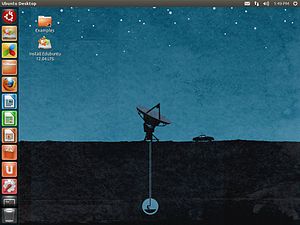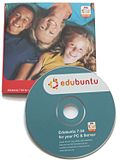Edubuntu
| 200px | |

Edubuntu 12.04 running Unity
|
|
| Developer | Canonical Ltd. and community contributors |
|---|---|
| Written in | {{#property:p277}} |
| OS family | Unix-like |
| Working state | Current |
| Source model | Open source |
| Latest release | 14.04 (Trusty Tahr) / 17 April 2014 |
| Kernel type | Monolithic Linux kernel |
| Default user interface | GNOME |
| License | Mainly GPL and various others (free with some restricted components) |
| Official website | www.edubuntu.org |
Edubuntu, also previously known as Ubuntu Education Edition, is an official derivative of the Ubuntu operating system designed for use in classrooms inside schools, homes and communities.
Edubuntu has been developed in collaboration with teachers and technologists in multiple countries. Edubuntu is built on top of the Ubuntu base, incorporates the LTSP thin client architecture and several education-specific applications, and is aimed at users aged 6 to 18. It is designed for easy installation and ongoing system maintenance.
Features
Included with Edubuntu is the Linux Terminal Server Project, a large number of educational applications including GCompris, KDE Edutainment Suite, Sabayon Profile Manager, Pessulus Lockdown Editor, Edubuntu Menueditor, LibreOffice, Gnome Nanny and iTalc as well as many more. Edubuntu CDs were previously available for free through their Shipit service. As of version 8.10 (2008), it is only available as a download in a DVD format.
Edubuntu's default GUI is Unity while GNOME is still available.[1] Unity has been the default GUI since the release of 12.04. Since release 7.10, KDE is also available as Edubuntu KDE. Since Ubuntu 10.04, the Edubuntu community has also worked[2] with the Qimo 4 Kids project to provide a Qimo desktop that is Xfce based.
Project goals
The primary goal of Edubuntu is to enable an educator with limited technical knowledge and skills to set up a computer lab or an on-line learning environment in an hour or less and then effectively administer that environment.
The principal design goals of Edubuntu are centralized management of configuration, users and processes, together with facilities for working collaboratively in a classroom setting. Equally important is the gathering together of the best available free software and digital materials for education. According to a statement of goals on the official Edubuntu Website: "Our aim is to put together a system that contains all the best free software available in education and make it easy to install and maintain."[3]
It also aims to allow low income environments to maximize their available (older) equipment.
Versions
The first Edubuntu release coincided with the release of Ubuntu 5.10, which was codenamed Breezy Badger on 2005-10-13. With the 8.04 Hardy Heron release of Edubuntu it was given the name of Ubuntu Education Edition[4] and was changed to be an add-on to a standard Ubuntu installation instead of being an installable LiveCD. From version 9.10 onwards, Edubuntu changed to be available as a full system DVD instead of an Add-on CD.[5] Edubuntu is also installable[6] via a selection of "edubuntu" packages for all distributions using the official Ubuntu repositories (Ubuntu and Kubuntu mainly).
Since 14.04, Edubuntu has become LTS-only,[7] which means the next release will be 16.04.
See also
- List of Ubuntu-based distributions
- OSDDlinux based on Ubuntu
- UberStudent Linux based on LTS versions of Xubuntu
- Skolelinux based on Debian
- EduLinux based on Fedora
- Sugar-on-a-Stick educational Linux distribution based on Fedora
References
- ↑ Lua error in package.lua at line 80: module 'strict' not found.
- ↑ Lua error in package.lua at line 80: module 'strict' not found.
- ↑ Lua error in package.lua at line 80: module 'strict' not found.
- ↑ Lua error in package.lua at line 80: module 'strict' not found.
- ↑ Lua error in package.lua at line 80: module 'strict' not found.
- ↑ Lua error in package.lua at line 80: module 'strict' not found.
- ↑ https://www.mail-archive.com/ubuntu-release@lists.ubuntu.com/msg02686.html
